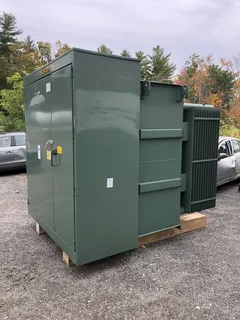How Grid Modernization Is Driving Demand for Pad Mounted Transformers

Introduction
The US pad mounted transformer market is a crucial segment of the nation’s power distribution infrastructure, supporting safe and reliable electricity delivery across residential, commercial, and industrial applications. These ground-mounted, enclosed transformers are designed for both underground and above-ground power distribution systems, offering durability, efficiency, and enhanced safety in densely populated or environmentally sensitive areas. As the United States accelerates grid modernization, renewable energy integration, and urban infrastructure development, demand for pad mounted transformers continues to surge. Technological advancements and the rising need for reliable energy distribution networks are further transforming the market landscape.
Market Drivers
Key factors driving the US pad mounted transformer market include rapid urbanization, expansion of renewable energy projects, and the ongoing replacement of aging grid infrastructure. The increasing number of housing projects and commercial buildings is boosting demand for underground and outdoor electrical distribution systems. Moreover, government initiatives promoting smart grids and energy efficiency are propelling utilities to adopt modern, compact transformer solutions. The growing penetration of distributed energy resources (DERs) and renewable integration—especially solar and wind power—also necessitate robust and flexible power distribution equipment. Additionally, the electrification of transport and the rise in electric vehicle (EV) charging stations are further fueling demand for reliable distribution transformers.
Market Challenges
Despite strong growth, the US pad mounted transformer market faces notable challenges. Volatility in raw material prices, particularly copper and steel, significantly impacts manufacturing costs and profit margins. Supply chain disruptions, primarily affecting transformer components and electrical steel, have caused production delays in recent years. Environmental concerns related to the use of insulating fluids, such as mineral oils, pose regulatory and sustainability challenges. Furthermore, utilities and manufacturers are under pressure to enhance transformer resilience against natural disasters, vandalism, and cyber threats. The long lead times in grid upgrade projects and procurement processes also slow market adoption.
Market Opportunities
The growing focus on renewable energy integration and smart distribution networks presents immense opportunities for the US pad mounted transformer market. Development of eco-friendly transformers using biodegradable ester-based fluids and dry-type designs is gaining momentum. Utilities are increasingly investing in grid automation and digital monitoring, driving demand for transformers with integrated sensors and communication modules. The expansion of electric vehicle charging infrastructure across cities, highways, and commercial spaces offers another significant growth avenue. Manufacturers focusing on compact, modular, and low-maintenance designs are well-positioned to capitalize on the country’s push toward sustainable and resilient energy distribution systems.
Regional Insights
Regionally, the southern and western US dominate the pad mounted transformer market due to large-scale infrastructure development and renewable energy deployment. States such as Texas, California, and Florida are leading in distribution system modernization and renewable grid integration. The Midwest is witnessing steady demand driven by rural electrification and substation upgrades, while the northeastern region focuses on urban renewal and underground cable networks. Favorable regulatory policies and increasing public utility investments in energy reliability and storm resilience further support market growth across multiple states. The presence of leading manufacturers and technology providers enhances innovation and market penetration.
Future Outlook
The future of the US pad mounted transformer market looks promising as the country transitions toward smarter, greener, and more resilient power networks. The adoption of digital technologies like IoT, AI-based diagnostics, and predictive maintenance will redefine the way transformers are monitored and maintained. As electrification spreads across industries, demand for reliable medium-voltage distribution solutions will continue to rise. Eco-design standards and sustainability mandates will accelerate the development of low-loss, energy-efficient transformers. By 2035, the integration of renewable generation and storage systems into local grids will make pad mounted transformers indispensable in building a decentralized, secure power infrastructure.
Conclusion
The US pad mounted transformer market is undergoing significant evolution, driven by modernization, sustainability, and technological advancement. As utilities and industries invest in smarter grid systems, these transformers will remain vital to ensuring efficient and resilient power distribution. While material costs and regulatory complexities pose challenges, innovations in digital monitoring, eco-friendly fluids, and design efficiency will sustain market momentum for years to come.
- Art
- Crafts
- Dance
- Wellness
- Movie & Television
- Adult Entertainment
- Fitness
- Food
- Games
- Gardening
- Health
- Home
- Literature
- Music
- Business & Finance
- Religion
- Shopping
- Sports
- Theater
- Drinks
- Other



